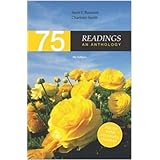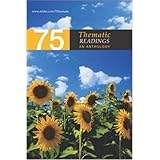
Average Reviews:

(More customer reviews)I adopted this book for two sections of ENG 101 at a community college. I know there is a controversy over teaching literature in ENG 101 and this is not a literary collection. Indeed, the selections are well rounded.
I approach teaching this class with several concerns foremost in my mind:
The poor vocabularies of today's young people.
The inadequate knowledge of science among the same group.
The manner in which discussions of history are conducted in this country.
The fact that so little literature is read by far too many of today's students.
The death of the sophomore literature survey course (Romantic Poets, Elizabethan Drama, Contemporary Drama, 19th C. American Literature, etc.)
I selected this book because it has selections on science, history and politics as well as memoirs and classics (Jonathan Swift's A Modest Proposal).
101 is the introduction to college writing and the course that teaches students how to research. I offer the students 8 choices of what I call projects, books which should serve as the basis for their research paper as well as for a compare and contrast paper (one of three essays). This semester, I offered them Shakespeare's 12th Night; The Short Stories of Eudora Welty; The Narrative of Frederick Douglass; Brave New World; Nineteen Eighty-Four; Poems of Love; the Ramona Quimby novels of Beverly Cleary, and Ever Since Darwin by Stephen Jay Gould. The idea is to offer substance and choice; stimulate thought and dialog; familiarize them with history and science; look ahead to potential teaching careers and more.
I do not teach a political point of view. No responsible teacher should. That Buscemi and Smith included opposing views on global warming and social responsibility is wonderful. But, I do have problems with two of the essays, both in the cause and effect section. One is by Shelby Steele and the other by Barbara Dafoe Whitehead. As both authors represent a conservative point of view, I would love to have the students read these essays. Steele's old essay, written in 1990, displays his anger and his conservative politics. Are these teenaged students sophisticated enough to tease out that his stance stems from both? Whitehead's piece earned from me the same criticism that others have leveled at the organization she co-directs, the National Marriage Project: that some of her (its) claims are not substantiated. Recognizing her tendency toward strawman arguments, I can choose to ignore her work, and, I probably will. However, I could pair it the Jonathan Kozal essay offered in the argument section of the book (and with a couple of selected installments of Mad Men, if I had the time), but. . . is there a value in offering an example of bad writing? That is the crux of the matter, isn't it?
So, why did Buscemi and Smith offer a flawed, incendiary piece (Steele's) and a sloppily written piece in an otherwise excellent anthology?
Click Here to see more reviews about:
75 Readings: An Anthology75 Readings and 75 Readings Plus offer an outstanding collection of the most popular essays for first-year writing, at an affordable price.This edition boasts new readings about social issues and the environment, expanded argumentation coverage, and a section on mixed strategies—readings employing multiple rhetorical modes.

Click here for more information about 75 Readings: An Anthology




